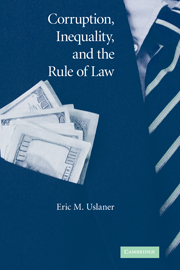Book contents
- Frontmatter
- Contents
- Preface
- 1 Corruption: The Basic Story
- 2 Corruption and the Inequality Trap
- 3 Corruption, Inequality, and Trust: The Linkages Across Nations
- 4 Transition and the Road to the Inequality Trap
- 5 The Rocky Road to Transition: The Case of Romania
- 6 Half Empty or Almost Full?: Mass and Elite Perceptions of Corruption in Estonia, Slovakia, and Romania
- 7 The Easy and Hard Cases: Africa and Singapore and Hong Kong
- 8 Corruption Isn't Inevitable, But …
- 9 Conclusions
- Appendix
- References
- Index
6 - Half Empty or Almost Full?: Mass and Elite Perceptions of Corruption in Estonia, Slovakia, and Romania
Published online by Cambridge University Press: 27 July 2009
- Frontmatter
- Contents
- Preface
- 1 Corruption: The Basic Story
- 2 Corruption and the Inequality Trap
- 3 Corruption, Inequality, and Trust: The Linkages Across Nations
- 4 Transition and the Road to the Inequality Trap
- 5 The Rocky Road to Transition: The Case of Romania
- 6 Half Empty or Almost Full?: Mass and Elite Perceptions of Corruption in Estonia, Slovakia, and Romania
- 7 The Easy and Hard Cases: Africa and Singapore and Hong Kong
- 8 Corruption Isn't Inevitable, But …
- 9 Conclusions
- Appendix
- References
- Index
Summary
If at first you don't succeed, then try and try again.
And if you don't succeed again, just try and try and try.
Useless, it's useless.
Our kind of life is tough.
Take it from me it's useless. Trying ain't enough.
Since people ain't much good just hit 'em on the hood.
But though you hit ‘em good and hard they're never out for good.
Useless, it's useless when they're playing rough.
Take it from me it's useless.
You're never rough enough.
From “The Useless Song,” Berthold Brecht and Kurt Weill, The Threepenny OperaRomania's mixed success in the transition to a market economy, together with its legacy of ethnic conflict, poverty, and corruption, makes it easy to understand why its public is so pessimistic. Estonia and Slovakia have had a much more successful transition – especially to a market economy run under the rule of law, democracy, and relatively low levels of corruption. Estonia's capital, Tallinn, is a “boomtown,” the surging economy called the “the Baltic tiger, the sequel to the Celtic tiger [Ireland] as Europe's success story,” fueled by so many high-tech companies such as the Internet phone service Skype that outsiders call the country “E-stonia” (Tierney, 2006). Slovakia is a less prominent success, yet it has largely escaped the high levels of economic inequality that have been a hallmark of most transition countries and fares better than most former Communist states on corruption.
- Type
- Chapter
- Information
- Corruption, Inequality, and the Rule of LawThe Bulging Pocket Makes the Easy Life, pp. 151 - 179Publisher: Cambridge University PressPrint publication year: 2008



